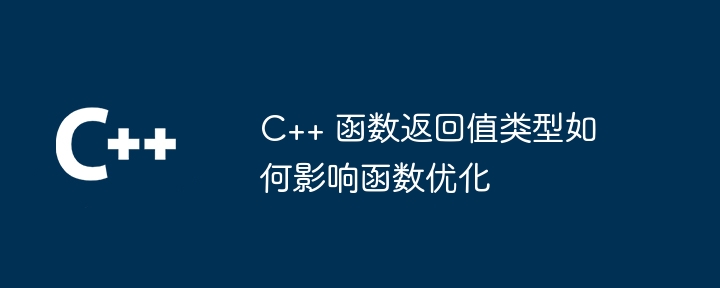
C function return type is crucial for compiler optimizations, optimizing code execution paths: primitive types (int/float) allow arithmetic optimizations (constant folding, common subexpression elimination). References and pointers improve performance, but be aware of return value types and compiler optimization limitations. Functions of the void type have no side effects, allow optimizations such as inlining, and eliminate function call overhead. Case studies show that using void as the return value type of a complex addition function improves performance and avoids object creation and return overhead.

C function return value optimization
The function return value type is crucial to function compiler optimization. The compiler can infer the execution path of the code based on the return value type and make corresponding optimizations.
Basic types
For basic types (such as int, float), the compiler can perform the following optimizations:
int add(int a, int b) {
return a + b;
} The compiler knows that the result is an int and can perform arithmetic optimizations such as:
References and pointers
References and pointers can improve performance, but special attention needs to be paid to the return value type.
int& max(int& a, int& b) {
return a > b ? a : b;
}This function returns a reference to an int, not the int itself. This allows the function to modify the original variable, but the compiler may not be able to optimize because it doesn't know which memory location the reference points to.
void
If the function does not return any value, use void as the return value type. This tells the compiler that the function has no side effects, allowing additional optimizations, such as:
void swap(int& a, int& b) {
int tmp = a;
a = b;
b = tmp;
}The compiler can inline this function into the code that calls it, eliminating the overhead of the function call.
Case Study
Consider a function that adds complex numbers:
Complex add(const Complex& a, const Complex& b) {
return Complex(a.real + b.real, a.imag + b.imag);
}Using a Complex object as the return type limits optimization . Using void as the return value type can achieve performance improvements:
void add(Complex& result, const Complex& a, const Complex& b) {
result.real = a.real + b.real;
result.imag = a.imag + b.imag;
}This void function can be inlined, eliminating the overhead of object creation and return.
Conclusion
Choosing the appropriate function return value type can significantly affect the optimization of functions in C. By understanding the behavior of primitive types, references, pointers, and void, you can write code that strikes the best balance between performance and maintainability.
The above is the detailed content of How C++ function return value types affect function optimization. For more information, please follow other related articles on the PHP Chinese website!
 What are the differences between c++ and c language
What are the differences between c++ and c language
 Recommended learning order for c++ and python
Recommended learning order for c++ and python
 Cost-effectiveness analysis of learning python and c++
Cost-effectiveness analysis of learning python and c++
 Is c language the same as c++?
Is c language the same as c++?
 Which is better to learn first, c language or c++?
Which is better to learn first, c language or c++?
 The difference and connection between c language and c++
The difference and connection between c language and c++
 C++ software Chinese change tutorial
C++ software Chinese change tutorial
 Cost-effectiveness analysis of learning python, java and c++
Cost-effectiveness analysis of learning python, java and c++




